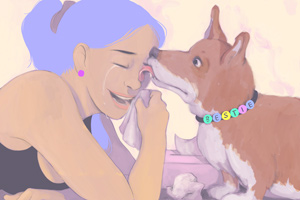
In concomitance with the recent publication of her debut novel Smoke gets in your eyes and other lessons from the crematory in its Italian version, we had the great privilege to interview Caitlin Doughty.
Smoke gets in your eyes and other lessons from the crematory, which came out in 2014, has been acclaimed worldwide: over the course of the years that followed its publication, have you witnessed differences in the way women and men received it?
Women, in general, have been the bigger fans. My webseries is watched by 75% women. Women are primarily the ones who are changing the funeral industry, advocating, helping people have funerals at home. I think women, marginalized people, LGBT people, etc are the ones who have traditionally been kept out of the funeral industry, not allowed to work as funeral directors or open funeral homes. So they feel most connected to the movement because they are the people most invested in seeing things change.
We are big fans of your YouTube channel Ask a Mortician, and we LOVE your irony in exploring the most mind-blowing things one could possibly think of in terms of death. In the video Death and Feminism you touch upon the subject of the recently increasing number of women nowadays employed in the funeral industry. Do you have any thoughts on why this profession has seen such an increase in recent times? Is it just the gradual demolition of gender barriers in all professions that has opened new career paths for women in areas previously dominated by men, or do you think there something else that contributed to it?
There are women breaking into all sorts of male dominated fields, but I think the funeral industry is somewhat unique since this male dominated field used to be a female dominated field. One hundred years ago death happened in the home, dead bodies were cared for in the home, and this was a task that was done by females. Then in the 20th century death became a business that men ran and charged big money for. So I think women are waking up to this fact. We want to take care of the corpses again, we want the experience of grieving and mourning to be more intimate and public. We don’t want men in suits to tell us what we can and can’t do with our own dead. And that’s why you see so many women entering the field now.
Can you remember for us some anecdotes about your work with other male professionals, and what has helped you in presenting yourself as credible professionals in their eyes?
Looking back, I’ve had crematory workers corner me in the body cooler and threaten me, embalmers make sexual comments, managers ask me out repeatedly. Honestly I wouldn’t put up with these things today. Part of it is because I’m older, but I think our culture has also gotten better in saying “this is not acceptable.” I remember reporting the manager who was constantly asking me out and being creepy, and the corporate funeral office said, basically, “we’re not sure what you want us to do.”
On the other hand, I’ve also worked with men who were incredible mentors. 100% professionals and who wanted to foster and help my career. Men who never thought I couldn’t do something because I was a woman. Those are the bosses and mentors that I want to impress. For them I wanted to prove myself as a worker, not as a woman.
Your activism to foster a more natural, intimate dealing with the body of the decedent has prompted more people to handle their beloved ones at home. Your funeral home supports the idea that families should take care of their decedents instead of letting professionals handling them. Can you tell us more about the people who approach you requesting your services? What are their fears, and their reaction to the process of taking care of their dead ones?
When we first started our funeral home we thought people would need their hands held while taking care of a body at home. That we would need to drive to homes in the middle of the night to help families close eyes and mouths and put on sweaters. But in truth we hardly do that at all. Once we give information to the family, and empower them to take charge, they do the work themselves. They don’t need a funeral professional. We just pick up the body when they’re ready, whether it be 3 hours or 3 days later.
In the past, taking care of the corpse was essentially a female task, as well as nurturing the suffering ones and consoling the grieving. Is the burden of female emotional labour still heavy among the people who request your services? How do you try to stimulate a higher participation of male members of the family in taking care of their dead ones?
I think about this a lot. I’ve been asked, “if we return to the practice of home funerals, won’t that put the burden on women to take care of the bodies?” Perhaps, but taking care of our dead isn’t a burden, it’s a profound privilege. It’s a life changing, beautiful experience. Taking care of the dead not akin to domestic tasks like cleaning, cooking, etc. Men are truly missing out if they don’t participate in caring for the dead.
Some of the biggest death stories recently out of the UK and the US have been husbands caring for their wives at home. So I have hope for men doing this as well.
Debunking the myth of embalming and other well-established mortuary traditions in the USA is definitely brave. We know you’ve been contested heavily by members of the National Funeral Directors Association, and in general by other professional in the field who are in strong disagreement with your principles (and are vocal about that on your social media). How much of this do you think has to to with the fact that you are a woman, and how much with the actual content of your ideas?
This is a great question. It’s always more obviously when the comment ends with something like “sweetie” or “young lady” or something demeaning like that. Now that I’m in my 30s it’s gotten so much better than when I was in my 20s. I think men are more scared of me now. And with good reason. If you post a comment about me that is wildly misogynistic or gross or talks about whether or not you would have sex with me I’ll post that on social media. I’ll call you out.
I will say that young female funeral directors are much more likely to agree with me and follow me than the older male funeral directors, but that’s not surprising. I’ll still see comments from them asking “when are her 15 minutes of fame up?” I’ve been doing this for 10 years, I think I missed the 15 minutes of fame category.
We are currently reading your book From Here to Eternity, where you explore the mortuary customs of different countries. If you could import one of the foreign tradition you witnessed in the United States, what would that be?
The corpse hotels of Japan! They have hotels where families can come from out of town to stay with the bodies. They are for families that want to have a wake at home but the apartments in Tokyo are too small. I’m not sure how many people in Los Angeles would want that, but I want them to want it.





Nessun commento